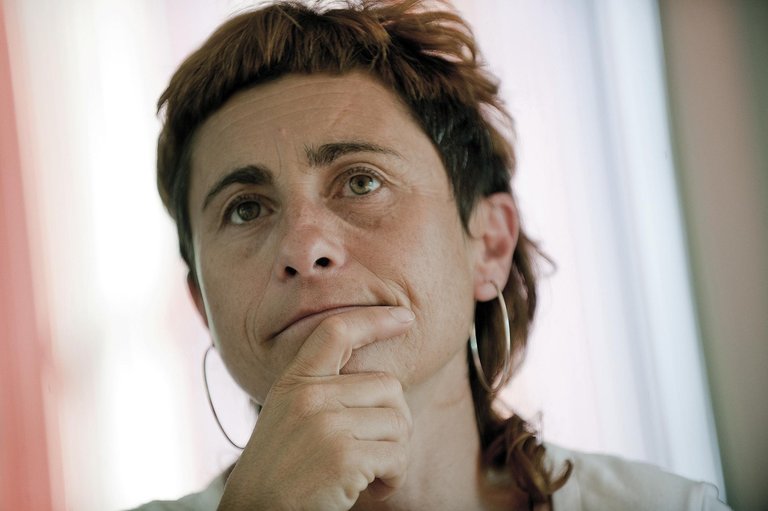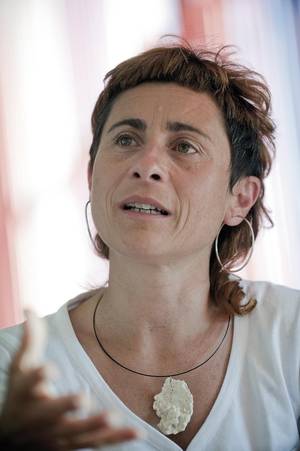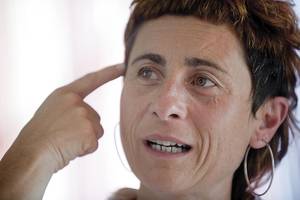"We have to think about who suffers the consequences of our research"

Yes, that's a topic, and I don't do many topics about scientists. In my world I have always been an extraordinary element, because my trajectory has not been very normal in the scientific world. I have always tried to make a critique of science, or at least if it is not critical, of what we reflect on.
At first I got into engineering and did a thesis on materials. And from there I went to be an engineering professor. But on that path, because in life many things happen to you and because I reflected on them, I started working on science and technology and gender.
However, in delving into it, I saw that the issue was not just the number of women in science or engineering, but that there was a reflection on the characteristics of science, and I got into the background.
That is. Evelyn Fox Keller is a physicist and epistemologist I first read this kind of thing. He says that at first he got into it worried about why women did not participate and that he has finished analyzing how science is.
In my case it is also so. That is, it is not about the difficulties women have or their lack of capacity to enter the scientific world, but about how science is from our point of view: what values there are, what characteristics it has, if it is neutral, what objectivity consists of, what interests are behind science... In that I have been in recent years.
To begin with, I have seen the importance of science in our society. There are studies that demonstrate the XVII. Since the scientific revolution of the 20th century, from Newton, Descartes and all of them, science replaced religion in some way.
Since then, science has a great importance in society; science and technology. In fact, there is now talk of technoscience, and it is technoscience that brings together a network or a structure in economic, political, scientific aspects... And today there is no such scientist you said at first, who lives isolated in your laboratory; the scientist is within that structure.
Then science is given importance because we believe it is neutral, that it is objective, and that is what happens because only we see the tip of the iceberg. For example, when they say that "this is so, scientifically it is proven", we do not see that to get to that perhaps some conditions have been preceded, and that the result they show us is only the tip of the iceberg.
I am especially interested in this issue, because it seems to me that we live in a sick society; both society and the Earth itself are sick. And I think it's important that scientists reflect on the role we have there: what consequences our work has, what applications... Other areas too, eh! Lawyers, doctors… all have responsibility, but as I am a scientist I would like you to reflect on our responsibility.
Not that, I don't judge anyone. But perhaps many times we try to make a distinction. I don't know if it's bleaching or because we think so. In any case, I remember that when I wrote a thesis on materials, because many applications are military, and to me that caused great contradictions. Maybe not another, eh! But to me yes. Because, I insist, science is not neutral. And you are researching the ability of a drilling material to know it. Then, however, comes the app, and you know they'll use it to make projectiles, and maybe you're submissive. That will create a restlessness. I think you should create it, at least I was created.
When I asked my director or a colleague, I said, "Enkarni, that's not your problem. Your job is to know the characteristics of this material and that is where your work ends. What others will do with your work, that is the responsibility of politicians." I disagree with it. I think it is also our responsibility. Do we have more responsibility than the rest? No, everyone has their responsibility in their field and scientists are no different in it. We cannot differentiate things and we must think about who suffers the consequences of our research. We must ask ourselves: "Am I willing to take these conclusions on my back? ".
Another thing I was told was “if you don’t, someone else will.” Well, let another do it! I don't. I think that reflection would have to be done more. The truth is that the consequences of our work are not very evident; for example, in our superdeveloped society we do not see the damage caused by the weapons we manufacture.
Or they can happen nearby, in our society there are many problems. But it is as if we lived in parallel universes. As I said to a friend, is the sea the same for everyone? No, because some have very different experiences and others.
That is. So we often don't see the consequences of our technology. And this is also not taken into account in studies. In engineering, at least, there are not many subjects that allow us to reflect on these kinds of things. Therefore, it is the teacher's responsibility to give them, even indirectly. But integration into subjects is usually not easy. Perhaps in other careers, when it becomes apparent that you are working with people, such as medicine or journalism.
But since science is supposedly neutral and has the same thing to put a tube here, or to make a road out there or here, and point, no other approach is made, nor do you think what consequences it has for the peoples that the road excludes or unites and how it affects the neighbors of the area and those of the distance. A distinction is made: politicians have decided to make the road and I have only fulfilled what I have decided.
I think that cannot be separated like this, but that culture is not integrated into careers and then it is difficult to develop oneself. It is true that our lives are also difficult, because if I refuse to make a road we can have consequences. In addition, we know that if we don't do it we will do it another person, while our children will not have food. These personal decisions are understandable, so I'm not who because he has made weapons to judge anyone, or because he has driven a project in Guatemala or has known what research he has done. But as a society I would like to reflect.
Therefore, my concern is not only that of women. I have left feminism, but that road has opened other doors for me, and now I am there. It is not only a problem of women, but of the social structure. We have to think about where our society is going and what we, scientists, can do.
In fact, I have seen in the magazine Amaia Pérez Orozco [ Elhuyar magazine, number 286] and I love some of her theses. For example, as for the economy, it says that life must be put at the center of the economy. I think that also serves our case, and I said it before, though in other words. Before meeting Amaia Pérez Orozco, she read works by others, such as Donna Haraway, who says something similar to what Amaia Pérez Orozco says, but with questions: "Who lives and who dies? ". This question has marked my path. In the end, the question is who is at the center of my project, who lives, who dies? What life values does it stimulate? Putting life at the center of science.
Yes, but considering that not all lives are equal. You have to ask yourself which lives are desirable, stimulating, that is the line of Judith Butler. Therefore, scientists must also think about what kind of life is habitable, what kind of life and what society we want to promote. My mother asked the following question: "Does this add beauty to the world? ". And I think that is also on the same line.
Within it, there are two approaches: patching or deepening the whole. There is a tendency to think that technology can solve everything. The other day I heard that in Spain the rate of childhood obesity was the highest in the world. And a few days earlier they mentioned another research in which they wanted to control saturation using a chip placed in the brain. That chip can be a solution to treat childhood obesity, yes, but for me that's a chapaton. Instead, I would seek to know what is wrong in society to have these problems. The one who is developing the chip will say that he is working for life, but for me that is just a bandage, that does not add beauty to life.
Yes, I also want to talk about it. In my eclectic career I have been finding people who, like me, are out of my usual path, and then create alliances. Thus, the UPV Master of Equality gave the subject of feminist science and had a student, Ainhoa Güemes. And years later I met that student somewhere else and there was a complicity between them.
Ainhoa is a journalist, master's degree in equality technique, but moves in the art world. And when we met, 5-6 years ago, we created a special work, a web. We call it Artecnociencia. The question is that to understand the world science is very important. Many times we have taken science as the most reliable way to explain the world, the most objective. But we believe that there are other ways, and one of them is art, that will give us a vision of the world, that they can equally be as useful as science, but that they are not so accepted or pushed.
And there was our alliance, bringing together an artist and an engineer, and saying: how we understand this world from different points of view and what tools we can develop to drive changes in society. An instrument can be art. Science, of course, and our reflection on science, but also on the world of art. What we do is, on the one hand, artistic work and, on the other, we write articles to promote the change or reflection of this society.
Ainhoa is now writing his thesis and has some legs: science, art, philosophy... and with that we are completing our puzzle. Many times we do not know what to do with this material, it is a relatively new path and we do not have many references, there is no fixed methodology… Somehow we are experimenting and I think it can give good results. In any case, it seems very enriching to introduce fresh air into a scientific world as compact as ours, in which I deal with my students.
Buletina
Bidali zure helbide elektronikoa eta jaso asteroko buletina zure sarrera-ontzian













